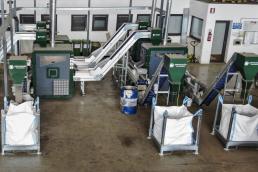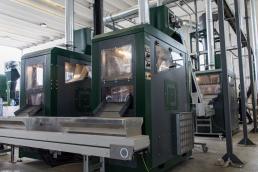Interview with Luigino Menegatti, owner and sales manager of Generation 3.0.
Located in the province of Vicenza, Generation 3.0 has commercial relationships all over the world, purchasing and exploiting a wide range of metal and ferrous waste and supplying secondary raw materials to the main national and international foundries and steel mills. Anticipating the recent market changes, Luigino Menegatti, together with his sister Valentina, have long planned a series of technological investments to perform End-of-Waste treatments even on the heaviest scrap. The start-up of the Panizzolo Recycling Systems refining plant allowed us to get to know the Menegatti family and their next business objectives better.
Good morning Luigino. How was the company born and how is it developing?
Generation 3.0 was founded in 2016 by my sister Valentina and I. We took over the business of Nuova Europa Metalli, of which our father had been the owner since 1983, embarking on a new path aimed at intercepting emerging market trends. Right from the start we invested in the best recycling technologies, consolidating excellent business relationships all over the world and differentiating ourselves from the classic scrap dealer.
Being innovative is very important to us. We have launched a company policy aimed at enhancing the heaviest waste, with the aim of recovering up to 95% of the incoming material and from which we are reaping many economic benefits with satisfaction.
Compared to the role you play in Generation 3.0, what is your experience and your vision of the scrap market?
In the role of commercial director, I directly follow the purchases and sales of scrap and raw materials, also ranging in researching and analyzing new technologies on the market. Time permitting I also point to directly supervising the internal treatment cycle. Starting to work in my father’s company at the age of 18, I have built up an important background of pure practical experience. Also working a lot with abroad, I was able to develop a strong interest in the treatment of scrap, especially in the enhancement of the more complex types.
Landfills will no longer be sustainable in the long run and many countries are blocking the import of waste. My vision of the future is a market where scrap is recovered and refined as much as possible, selling a high quality and palatable final product anywhere in the world.
In which countries are you commercially present? What type of scrap do you treat?
Our range of action, both in buying and selling, extends to almost all continents of the world. We have several contacts with steel mills, foundries and raw material traders. We periodically diversify purchases and sales according to market needs, specializing in waste that must be handled and avoiding to compete for the purchase of semi-finished products such as sheet metal, turnings and sheared demolitions. In general, we prefer to purchase waste from other treatment lines, such as mixed metals, cans and zorba, which we purchase because we are able to enhance the metals contained thanks to the Panizzolo Recycling Systems refining plant.
Can you give us more details about the company structure?
In Generation 3.0 today we have about 13 employees, in a production area of about 30 thousand square meters. Inside there is an 800 horsepower hammer mill and various separation systems for the enhancement of the ground. We are currently authorized for 22,000 tons of waste per year but by the end of the year we will activate the new authorization, the second largest in Veneto, allowing us to move to 130,000 tons of incoming waste as well as increasing the range of CER codes.
Our goal is to become one of the leaders in the sector and, by marketing with the whole world, we must have an adequate storage area. Generation 3.0 is subject to Integrated Environmental Authorization (A.I.A.). We are also ISO 14000 and ISO 9000 certified and we scrupulously apply our internal environmental policy.
In choosing this path you have been influenced by the “Chinese National Sword”?
Not at all. When my sister and I started Generation 3.0, we already knew our goal was to install a refining plant. The closure of China is the result of twenty years of desperate exports, where certain waste was not treated because it was considered unprofitable. Unlike today the market needs to enhance them.
Since 2016 I have traveled to many European and non-European countries, looking for the plant that best suits our production needs. In the end I found that the one offered by Panizzolo was the most performing and technologically advanced
Can you explain better how you proceeded with your choice?
I went to the most interesting companies bringing samples of my material, in order to concretely see production, quality and wear.
By building a business plan for each plant, I identified in Panizzolo the right compromise between economic cost, productivity and long-term maintenance.
Panizzolo Recycling Systems is a well-known reality in Italy in this field. After a preliminary visit, I was able to test and touch the quality of the granulates in the Piove di Sacco plant. The machinery has very well designed precautions, especially the refining hammer mills. The material I deal with contains significant amounts of steel, iron and aluminum. Not being able to use traditional blade mills, the grinding method used by Panizzolo is truly intelligent, simple and innovative.
There were no other companies that offered comparable or interesting grinding systems?
When new, all grinders look interesting and beautiful to look at. The problem, however, is how the plant will behave in the medium to long term, what machine downtime it will be subject to, the wear it will suffer, the costs of spare parts and more.
The waste we deal with in Generation 3.0 has a percentage of metal that fluctuates between 10 and 20 percent, so for me the component of management costs is really very relevant.
Weighing all these things we concluded that Panizzolo Recycling Systems offered the most intelligent solution, with the right compromise of quality and processing cost, allowing us to make a good profit margin.
The purchase decision was influenced by the fact that Panizzolo operates directly in the treatment of scrap?
It certainly had an impact, because the best experience is in the field. Panizzolo Recycling Systems was able to offer me more guarantees than other companies. I was able to see with my own eyes design choices that were not taken for granted, made to protect the production interests of the output quality system.
The quality of the structures and carpentry is in line with the major European plant leaders, while its distinctive advantage lies in being able to modify and implement the plants according to production needs. Unlike other manufacturers, they do not contemplate the idea of listening to customers and making even small changes.

What investments have you planned to make with Panizzolo in the near future?
Over the next few months, we will install the Flex 500 Stationary Refine hammer mill. This will allow to pre-treat the material and increase the production performance of the refining plant.
I chose to rely again on Panizzolo Recycling Systems because its hammer mills have a very intelligent design, giving me an especially positive impression the double pulley rotor, the change of components subject to wear and the patented interchangeable cradle. A simple and high-quality machine that, like the refining plant, will allow me to save a lot of time.
While defining the layout, what struck you most?
I was very pleased that the company analyzed my production needs, recommending several upgrades that would further help me. In this way I have had confirmation of their vision aimed at maximum customer satisfaction, thanks to a continuous Research and Development activity.
What projects do you have for the refining plant? Where do you expect to arrive with respect to hourly productivity and quality of outputs?
Assuming that everything will depend on the quality of the incoming waste, our goal is to reach around 2.5 tons / h of incoming waste, in two daily 8-hour shifts. We will do two days of continuous production of 16 hours, while in the third we will dedicate a couple of hours for routine checks and maintenance. Cleaning, greasing, replacement of components subject to wear are fundamental activities to keep the system always efficient and performing at one hundred percent. Keep in mind that in the evening, at the end of the shift, I always demand that the most visible production areas are tidy and clean.
Panizzolo Recycling Systems is constantly present, assisting and supporting us in bringing the plant up to speed. We receive almost immediate answers and assistance, so I am sure that we will soon reach the set goals.
How do you keep your market information up to date?
Basically the market is made up of companies, consequently only through them can the healthiest and most useful information be found. I constantly compare myself with colleagues from all over the world, trying to intercept the most attractive market trends. There are also internet and specialized newspapers, but I prefer to speak directly with companies.
So what will the scrap industry look like in the near future?
In my opinion, due to the Coronavirus, we will still have a few months of suffering globally. So I don’t expect an immediate recovery in the short term. However, past this particular moment, I am optimistically convinced that five to eight years of hard work will follow. Our sector is constantly evolving, whether due to technological innovations or changes in regulations. We must therefore always be on the spot, ready to make new investments, change strategy or diversify work in the company. In recent years Generation 3.0 has been structuring itself with machinery and systems to cope with all this, guaranteeing us treatment flexibility like the new refining plant of Panizzolo Recycling Systems.

You notice other companies that are moving in the same direction as you?
Apart from the great historical realities, I see that many are frightened by the idea of such an investment. Starting a plant is challenging not only economically, but above all because it brings a total change of mentality. For a company that has always made commerce its main activity, it is not easy to understand the advantages that a treatment plant brings. Unfortunately, or fortunately for us, the mentality of many Italian and European companies is still stuck in simple trade.
What advice would you give to a company that is considering moving from trading to scrap processing?
That if he doesn’t want to hurt himself, first of all, he must have a clear idea of what he wants to do and where he wants to go. When you start to get involved on this front, it is good to know what you want to get out of the treatment plant and, consequently, to have fairly concrete commercial outlets. I don’t mean having a ready-made customer package, but at least knowing where to market the various outputs. The same thing also applies to those fractions on which disposal must be paid.
For example, before investing in the Panizzolo Recycling Systems refining plant, I did a market study to understand how to enhance the plastics that we will have obtained from the treatment process. A company that wants to thrive in this business must keep under control not only what is obtained from the plant, but in particular all the direct and indirect costs that processing can bring.